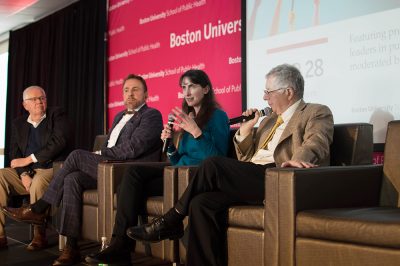
Public health professionals and educators from around the country gathered at the Boston University Medical Campus Wednesday for a symposium on teaching public health hosted by BU’s School of Public Health. The symposium featured presentations from public health leaders, educators and the wider public health community, and summarized the evolution of public health teaching over time.
For the symposium organizers, the goal was to establish a forum to discuss challenges faced by public health educators, address the principles and practice of teaching public health at each level of education, spotlight innovations in public health education and look to the future, anticipating where trends in public health education were heading.
Lisa Sullivan, associate dean for education at SPH, wrote in an email that the kinds of changes public health education has been facing in recent years is causing a blurring of the line distinguishing undergraduate public health curricula from those of graduate schools.
“There is tremendous interest in public health at the undergraduate level, which is great, but many more incoming students now have undergraduate majors in public health and thus, masters curricula must build on undergraduate training,” Sullivan wrote. “There must be a clear distinction between degree levels and better articulation across degree levels.”
Sullivan explained that students entering public health programs now are younger and less experienced than ever before. Public health is a highly interdisciplinary field, she said, and teaching effectively across disciplinary lines is a challenging task that needs to be overcome.
There were several speakers at the symposium who supported Sullivan’s beliefs and elaborated on them further.
Perry Halkitis, dean of Rutgers School of Public Health, talked about the misperceptions surrounding public health education and how important it is to view it holistically.
“I think we need to dispel this idea that public health is about biomedicine — instead, it is about a social approach and the important factors and the emotional factors are at its heart and soul,” he said. “Public health is an activist discipline, and I think that’s something that could be extremely exciting to undergraduates.”
Other speakers discussed the importance of inclusivity in the field of public health education.
Richard Riegelman, a professor and founding dean of the Milken Institute School of Public Health at George Washington University, spoke about the importance of educating students at community colleges about public health and showing them that it is a potential career path for them.
“What the community colleges and their framework needs is guided learning pathways to public health,” Riegelman said. “They need some guidance, they need some structure, they need some way to understand in community colleges how you get from where you are to where you’re going.”
The symposium was attended by students, professors and other professionals both from the field of public health and other fields as well.
Maria Bustos, a masters student at SPH, said she was delighted by the diversity of topics covered during the symposium.
“Things that I wouldn’t even have considered were … discussed,” Bustos said. “I also liked that the speakers were of very different backgrounds, so in the same session, we could have very different topics.”
Others said they attended the symposium because they thought it would be a great chance to see the work their peers were doing.
“I felt like this would be a good opportunity for me to meet with colleagues — to learn about some successful approaches that other people are taking towards their pedagogy and their approach to teaching public health,” said Bria Dunham, director of the Health Science Program at the Sargent College of Health and Rehabilitation Sciences.
Several pertinent professionals from across the country also at the symposium said they thought the issues being discussed were important for the development of the field.
“We’re training public health students to become the next practitioners of the workforce,” said Elizabeth Walker, a research professor at Emory University’s Rollins School of Public Health. “To be able to fully give them the skills they need, we need to have effective teaching methods that we use and evaluate and continue to adapt and change and grow.”
The symposium was concluded by closing remarks given by Laura Magaña Valladares, president and CEO of the Association of Schools and Programs of Public Health.
Valladares spoke about the importance of moving forward and getting rid of old methods that did not work anymore.
“We need to invoke the different actors, all the different stakeholders inside and outside the health sector, and of course, we need to provoke, and I’m glad you are provokers of this change,” Valladares said to those in attendance. “And hopefully all of us together, we break these chains we have of the past, because the difficulty lies not so much in developing new ideas as in escaping from the old ones.”
CORRECTION: A previous version of this article stated that the event took place at the BU School of Medicine. In fact, it took place on the BU Medical Campus. The event was hosted by the School of Public Health on the Medical Campus, not by the School of Medicine. The article has been revised for clarity.























































































































